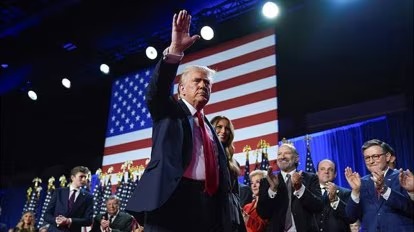Donald Trump’s 2024 victory marks a seismic shift in American politics, signalling the continuation of his populist movement and reshaping the political landscape. His return to the White House will deepen divides in U.S. governance, the Republican Party, and future elections. Trump’s second term promises to challenge political norms, with lasting implications for American democracy and the global order.
A New Era of Populism
Trump’s 2024 victory highlights the strength of his populist appeal, built on anti-establishment rhetoric, economic nationalism, and scepticism of globalism. His return to power reflects the continued relevance of populism as many voters reject traditional politicians and Washington elites. For his supporters, it represents a desire for a leader who directly addresses their frustrations and promises to “drain the swamp” of career politicians and bureaucrats.
However, his victory also signals the persistence of deep political polarisation. The American electorate is more divided than ever, with Trump’s supporters rallying around his vision of a nation prioritising domestic interests, while his detractors view his leadership as a threat to democratic norms and stability. Trump’s presidency has turned culture wars, immigration, race relations, and media distrust into focal points of political discourse, and his second term is unlikely to bring any reconciliation or moderation.
Reshaping the Republican Party
Trump’s resurgence is redefining the Republican Party, transforming it into a movement that prioritises his personal brand over traditional conservative values. His leadership has led to a major shift in GOP policies, focusing on issues such as nationalism, stringent immigration laws, and protectionist trade policies. The Republican Party, now firmly under Trump’s influence, is likely to double down on these positions, making it more populist and less beholden to establishment politics.
In the 2024 election, the GOP has embraced a more combative, “America First” approach that aligns closely with Trump’s vision. Future Republican candidates will likely need to echo Trump’s rhetoric to secure nominations, meaning the party will be more aligned with his values than ever before. This shift may also see the emergence of new candidates who are inspired by Trump’s style of governance, thus prolonging his influence on the political scene even after he leaves office.
Impact on Future Elections
Trump’s 2024 victory also sets the stage for future elections in the U.S. His political base remains extraordinarily loyal, and his continued dominance within the GOP ensures that his influence will be felt for years to come. The party will likely continue to embrace his brand of politics, with future candidates either aligning themselves with Trump’s policies or facing challenges from his supporters.
This long-lasting impact could mean that future elections, both presidential and mid-term, will increasingly revolve around Trump’s political legacy. His presence in American politics will shape voter behaviour, campaign strategies, and the issues that dominate the national conversation. The impact of his presidency is likely to reverberate far beyond 2024, with his influence shaping not only the Republican Party but also the broader political culture of the United States.
Conclusion: A Divided Nation and Uncertain Future
Donald Trump’s 2024 victory is a defining moment in American politics, reinforcing his populist movement and deepening the nation’s political divide. His return to power is likely to intensify partisanship and cultural conflicts, further polarising the political landscape. Trump’s influence will continue to shape the Republican Party and broader U.S. political discourse, leaving a lasting impact. Whether this leads to political stability or further fragmentation remains uncertain, but one thing is clear: his resurgence is reshaping the future of American politics.
Disclaimer – The views and opinions expressed in the commentaries/blogs/articles are those of the authors and do not necessarily reflect the official policy or position of the Forum for Global Studies.

